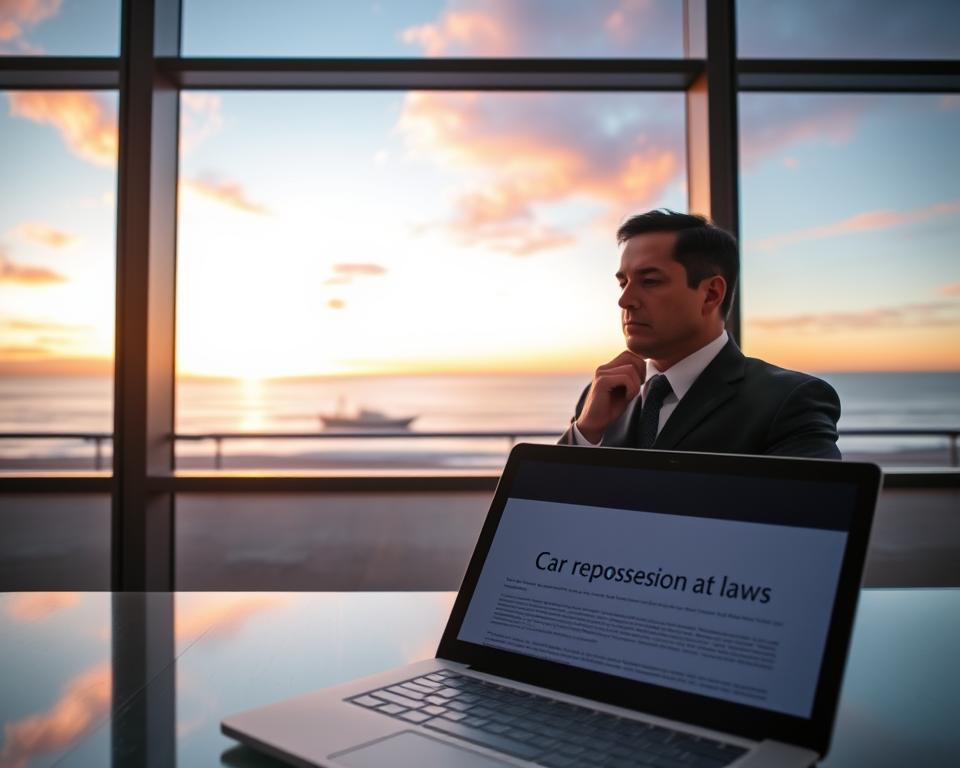Understanding car repossession Statutes in California
Ever pondered regarding the procedure in which a financier retrieves a car in the Golden State? Navigating California repo laws may prove to be intricate, particularly in the midst of economic stress. Once financings remain unsettled, financiers are able to promptly move to repossess. However, many lack understanding of the precise entitlements and obligations defined in California’s repossession statutes.
Upon a default on a loan, the Golden State allows lenders to take vehicles immediately. Yet, this does not make borrowers powerless. Comprehending these regulations is essential to borrowers aiming to safeguard their interests. The following text reviews principal elements of the Golden State’s Civil Code and trade statutes, outlining the path to repossession and debtor privileges. Knowledge plays an essential role, especially concerning your economic stability.
Overview regarding car repossession within California
The repossession of a car poses a major challenge for many within California experiencing monetary difficulties. Understanding its fundamentals for successfully managing anticipated challenges. It happens whenever a creditor retrieves a vehicle as a result of a violation in the loan terms. These measures might significantly disrupt one’s employment opportunities or get required assistance.
Defining car repossession?
The act of repossession happens when financiers retrieve vehicles from consumers in breach of their contracts. In California, defaulting on just a single due payment may initiate repossession. A grace period is not provided, prompting debtors to be watchful concerning their payment duties.
Common Triggers of Repossession
Being aware of the causes of repossession plays a vital role in prevention. Typical triggers comprise:
- Overlooking scheduled payments
- Neglecting the stipulated insurance coverage
- Breaching certain provisions of the financing contract
To evade repossession, proactive financial management and dialogue with creditors are imperative. These actions can help borrowers keep their vehicles and the freedoms they provide.
Grasping Repossession Laws in California
California’s rules on repossession protect the interests of both financiers and consumers. They guarantee a fair system during car repossession events. Grasping the essential legal components in repossession assists debtors. It sheds light on their privileges explicitly.

Principal Legal Clauses
These laws encompass vital provisions. Lenders are required to adhere to the Automobile Sales Finance Act. It specifies the notice obligations pertaining to borrowers. A mandatory Notice of Seizure must be provided following repossession. This notice furnishes the specifics regarding the title of the vehicle and the involved repossession agency.
Furthermore, every repossession agent must be licensed. This allows debtors to inquire about the agent’s credentials. These requirements greatly enhance protection for consumers under these statutes.
Privileges of Borrowers
Borrowers are granted specific rights that reinforce their safeguard in the repossession process. They are entitled to adequate notice beforehand. Grasping the process steps constitutes their entitlement. It’s also crucial they know threats or the use of force by repossession agents is prohibited. Legislation prohibits any action disrupting peace during the process.
These measures guarantee that people preserve their honor and security. It is crucial in what may be a tumultuous time.
The Process of Car Repossession in California
The California repossession process starts upon missed payments or insurance lapses. Being aware of the sequence assists consumers in managing this difficult predicament – repo attorney. Following paragraphs outline the procedure and the subsequent actions post-repossession.
Steps Leading to Repossession
When a consumer fails to meet loan obligations, the lender takes note. Repossession occurs without prior alert, as California doesn’t require it. Here are the steps:
- A default is initiated by missing payments.
- Even though it is not compulsory, the lender may attempt to reach out to the debtor.
- Following this, representatives move to repossess the car without warning.
Subsequent Steps After Repossession
Debtors receive documented notification within 48 hours post-repossession. This document includes essential details:
- Details regarding the lender and the involved agency
- A catalog of personal possessions within the car
Debtors have 60 days to recover their belongings. Not doing so allows the agency to discard them. There are judicial options available to oppose repossession, subject to individual conditions.
Combating Repossession within California
Facing car repossession in California can be intimidating. However, being aware of your available options significantly empowers you. By acting proactively, favorable results can be achieved. Grasping your legal entitlements in such circumstances is crucial.
Exploring Your Legal Alternatives
When challenging a repossession in California, identifying multiple legal approaches is essential. Debtors may consider:
- Negotiating directly with creditors for a feasible payment plan
- Modifying payment terms to better suit their economic condition
- Seeking legal assistance if their rights have been breached during repossession
Early communication with lenders enhances the likelihood of a mutually acceptable arrangement. Make sure all agreements are documented to avoid future misunderstandings.
Bargaining with Lenders
Bargaining with creditors is critical for addressing repossession issues. In cases where the repossession has occurred, contacting lenders quickly might help in getting the vehicle back. Negotiation strategies include:
- Asking for a temporary halt on payments
- Weighing the possibility of a voluntary car return to alleviate economic pressure
- Looking into alternative financial arrangements for unpaid debts
Keeping open lines of communication with creditors builds trust, thus paving the way for improved settlements. This trust can lead to better agreements, helping borrowers manage their financial issues more effectively.
Steps to Prevent Repossession
For retaining your car and dodging financial complications, being informed of precautionary steps is vital. In California, folks have several legal tactics to dodge repossession. These include engaging in frank discussions with lenders and making sure your insurance is up to snuff.
Sustaining Adequate Insurance Coverage
Retaining continuous insurance coverage is crucial for avoiding repossession issues. A robust auto insurance policy both safeguards against incidents and fulfills lender prerequisites. Should your insurance coverage falter, it may result in a breach of the finance agreement, endangering your car. Make it a habit to check and renew your policy to stay in line and worry-free.
Communication with Lenders
Interacting with financiers plays a key role in deterring car repossession. Expressing your monetary difficulties might present viable solutions. Creditors could modify your repayment plan or provide temporary relief in times of financial strain. Starting these talks early builds a foundation of trust, shielding you from sudden repossession risks.
The Bottom Line
Understanding the laws governing car repossession in California is critical for consumers wishing to protect their interests and properties. The prospect of repossession often results in a rapid and unexpected process. Such rapidity frequently affords little opportunity for an adequate response. Getting familiar with these laws can equip borrowers with the knowledge to take actionable steps.
This article clarifies the major components of car repossession statutes in California. It affirms that debtors comprehend both their duties and privileges in the repossession process. Knowing your legal options can help navigate through the potential complexities of repossession. This knowledge streamlines discussions with lenders and the search for beneficial resolutions.
By acting knowledgeably and maintaining communication with lenders, borrowers can reduce the risks tied to car repossession. Fundamentally, understanding your legal entitlements under California’s repossession laws is key. This knowledge fosters economic security and personal tranquility in challenging periods.
FAQ
How does a missed car loan payment affect me in California?
Within California, a missed payment may promptly result in car repossession. Lenders may immediately seek repossession without a mandatory grace period.
Which rights do I have during repossession?
Post-repossession, a Notice of Seizure will be provided to you. This notice outlines the vehicle’s title details and provides the contact information of the repossession agency. Repossession agents are required to be licensed. You are entitled to verify their credentials.
How can I prevent car repossession in California?
To avoid repossession, ensure timely payments for loans and insurance. Keep your insurance up to date. Engage in ongoing dialogue with your creditor during monetary difficulties to explore feasible payment plans.
What can I do if my car has already been repossessed?
If repossession has occurred, maintain communication with the lender for remedies including reactivation of your contract. Consider legal advice if you suspect your rights were disregarded.
Are there legal ways to fight a repossession in California?
Indeed, you can engage in direct negotiations with lenders to modify repayment conditions. Additionally, you can take legal action if repossession seems improper or violates state statutes.
What typically causes car repossession?
Missing loan payments, insurance lapses, and finance agreement breaches can lead to repossession. Understanding these causes is essential for avoidance.
How long do I have to reclaim my car after repossession?
There is a 60-day period following repossession during which you may recover your car. Beyond this period, the agency can liquidate your car and clear out any belongings.
Are creditors allowed to take back my car without warning?
Yes, California law permits vehicle repossession by agents without advance warning under specific legal situations.
What steps can I take if car payment issues arise?
If you’re facing payment difficulties, immediately inform your lender. Investigate possibilities including temporary relief or adjustment of terms to avert repossession.
